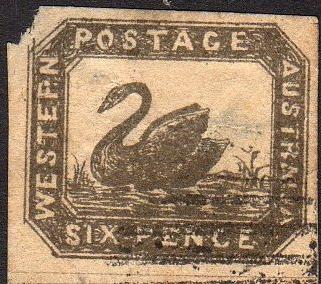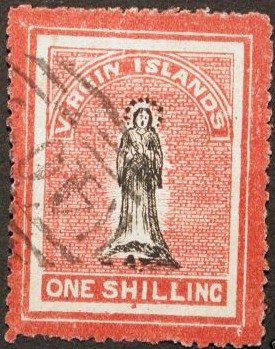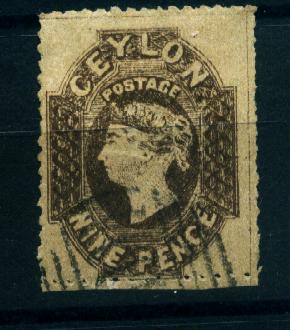 |
|||||
|
|||||
| Preview of Stamps Catalogue: VOLUME 1 |
 |
|||||
|
|||||
| Preview of Stamps Catalogue: VOLUME 1 |
1884(?) - ?
Note: on my website many of the
pictures can not be seen! They are of course present in the catalogue;
contact me if you want to purchase it.
According to Philatelic Forgers, Their Lives and
Works by V.E.Tyler, Harold Treherne first started forging stamps
in 1902. They are sometimes referred to as Brighton
forgeries after the town he was residing. He also used
the names G.Arnold, M.Melville (or N.Melville?), T.Morton,
R.Newman, R.Holden and A.West.
Complete forgeries exist of (according to Tyler): Western
Australia, South Australia, India (1854), Victoria, Duttia,
Charkari, St.Christopher, Transvaal and Jammu-Kashmir.
Forged overprints on genuine stamps exist for: Brunei, Ceylon,
Cyprus, Great Britain, Orange Free State and Negri Sembilan.
According to the same source, Treherne had a 'contact' in India,
Thomas Hill (Frere Hotel, Bombay) who send him genuine stamps of
India, which were subsequently provided with forged overprints.
The stamps were then send back to India and sold there.
More information: http://www.wastudygroup.com/Feature/Harold-Trehene.pdf.
He is probably most 'famous' for his Jammu and Kashmir forgeries.
Treherne forgeries of Western Australia:
I think a similar forgery in the value 2 p orange is described in Album Weeds. The letters are different from the genuine stamps. The eye of the swan is black (instead of white with a black outline). Note, some of the stamps have a '408' cancel.


Forgeries of the 6 p value, one of them with a '408' cancel.


Virgin Islands 1 Sh forgeries, one of them has a '408' cancel as
the above shown Western Australia forgeries.


These forgeries of Nevis also appear to have a '408' cancel, very
similar to the Treherne forgeries of Western Australia.




Ceylon forgeries, also some of them have the '408' cancel.

A sheet with Brighton forgeries of Jammu and Kashmir, made by
Treherne
The following text was found in "The Philatelic Record, Vol. XXIX, 1907, pages 161-164.":
The Brighton Stamp Case.
On August 2nd, before the Brighton
magistrates, a young man known as A.West (and said to be known
also by the aliases of G. Arnold, R. Newman, N.Melville, and R.
Holden) made his appearance on a charge of attempting to obtain
by false pretences from Mr. T. C.Appleton the sum of £45, the
monies of the Stamp Trade Protection Association. Formal evidence
having been given, the prisoner was remanded until August 9th.
The young man hitherto known as "West," but whose real
name is now given as Harold Treherne, made a further appearance
before the Brighton magistrates on August 9th on the charge of
attempting to obtain from T. C. Appleton, on or about 24th July,
the sum of £45, the monies of the Stamp Trade Protection
Association, with intent to cheat and defraud.
Mr. E. M. Marx prosecuted, while Mr.W. D. Peskett defended. The
magistrates on the Bench at the resumed hearing on August 9th
were Alderman Sendall (in the chair), Mr. Horton-Stephens,
Alderman Lowther, Mr.Martin, and Mr. Mackintosh.
Mr. Marx, repeating the opening statement he made at the last
hearing, explained that there are postage stamps which are
surcharged by the offices issuing them for certain purposes, a
fact which greatly increases their value. Prisoner had been a
dealer in stamps for some years, although only 21, and in
consequence of his having placed orders for large quantities of
stamps which lend themselves to surcharging, steps were taken to
see if he really wanted them for a legitimate purpose, with the
ultimate result that the present charge was brought against him.
Mr. William Boyd Kirkpatrick, stamp dealer and importer, of 157,
Strand, London, said he had been in the stamp trade about 15
years. He had had dealings with a Mr. West, of 130, London Road,
Brighton, which began in December, 1905, and continued up to
about a fortnight ago. There were a number of stamps which were
worth much more surcharged than unsurcharged. Those sold to West
were those which lent themselves to "surcharging," if a
person wished to defraud. Similar stamps had been at some time
surcharged by the authorities. He bought these stamps in large
quantities, and only once or twice purchased stamps which could
not be surcharged. In April, 1907, witness received an order from
West for 100 one cent Labuan stamps. This
was a stamp which could be surcharged. The form of surcharge was
the word "Brunei" in block
letters at the top. This and the following orders aroused
witness's suspicions, and, in consequence, he communicated with
Mr. Appleton and Mr. Telfer. A meeting was held on 31st May, at
the offices of Mr.Hadlow, 12, Adam Street, Strand, at which
witness, Mr. Hadlow, Mr. Oliver, and Mr. Telfer were present.
Certain stamps were then marked with secret marks—a pinhole
in certain positions of the stamp. Mr. Telfer made a record of
the marks, and witness and the others present signed it. More
stamps were marked at a meeting on 26th June, and a record was
kept in the same way. All these stamps had been ordered by
"West," to whom witness posted them. When sent off all
the stamps were unused and unsurcharged. The first set sent
comprised only penny red English stamps; the second set, in
addition to three pennyred English, stamps of Negri Sembilan (one
of the Straits Settlements), Pahang, Ceylon, and the Orange Free
State. Witness had examined the album produced, and recognised
six 4 cent Ceylon lilacrose stamps as
being those which were marked in the way described. The price
charged for these stamps was 4d. each. If genuinely surcharged,
as they appeared to be in the book, they would be worth from 10s.
to 25s. each. Witness also identified three penny red
Cyprus stamps, which were supplied unsurcharged to
West at 3d. or 4d. each. If genuinely surcharged, as they
appeared to be in the album, they would be worth about £1 each.
The "overprinting" was very well done, and was very
likely to deceive.
Genuinely surcharged stamps were handed to the Bench to compare
with the alleged forgeries, which Mr. Monk said were beautifully
executed. Continuing, witness said three of the Negri
Sembilan stamps and one Pahang
stamp in the album were also supplied by him to West. The price
charged for the Negri Sembilan stamps was 4d. The Pahang stamp
was also sold for 4d., and if surcharged, would be worth 5s. One
of the Negri Sembilan stamps, if surcharged, would be worth
several pounds. It was not known to exist in this state.
Witness also identified two Orange Free State stamps.
They were not "overprinted" when he sent them out. He
received 2s. each for them ; surcharged they would be worth £1
each. Three stamps (produced) said to have been found on
prisoner, were also identified by witness, who supplied them in
an unsurcharged condition. Witness had been carefully through the
collection of stamps which he had received from Mr. Appleton,
and, excluding the stamps supplied by witness, its value was
£10.
At this point the Bench adjourned for lunch. On the resumption,
Mr. Kirkpatrick corrected his statement that one of the Negri
Sembilan surcharged stamps in the album was an
unknown variety. In the interval he had ascertained that it was
known.
Cross-examined by Mr. Peskett, witness said he was a member of
the Stamp Trade Protection Association, Limited. During the time
West was dealing with him he received considerable sums of money
from him. Questioned at some length he adhered to his estimate of
£10 as being the value of the collection of stamps in the album
produced. If he were selling it entire he would be satisfied with
£2 profit; if he broke it up he should expect more. Possibly in
the latter case, he would get £20.
Mr. John Stanley Glasspool Telfer, Secretary of the Stamp Trade
Protection Association, Limited, spoke as to attending the
meetings mentioned by the last witness, when certain stamps were
marked. Witness recorded the markings as they were made. He
identified the 15 stamps under discussion in this case, and
contained in the album (produced), as being among those marked on
those occasions. Detective- Superintendent Wood had handed to
witness the stamps which were alleged to have been found on
prisoner and at his house, and witness picked out three which
were also marked at the two meetings. None of these stamps were
surcharged when they were marked. Mr. Appleton had been
negotiating with "Mr. Arnold," of Russell Square,
Brighton, on behalf of the Protection Association, and on 26th
July he handed witness the stamp album produced.
Mr. Marx asked if shortly after the arrest of the prisoner a
quantity of blocks, dies, stamps, &c, was shown to witness.
Mr. Peskett objected to this question. The police, he said, got
hold of these things in an illegal manner, and now wanted to use
them to the prejudice of the prisoner. He contended that they
ought not to benefit by something they did of an illegal nature.
He protested against this continual searching of prisoners'
houses without a search warrant when the warrant was only one of
arrest.
The Chairman said that surely everything that would tend to the
elucidation of the matter at issue was desirable. They had to
avail themselves of all means of getting at the truth. Mr.
Peskett : Illegal or not.
Mr. Marx said there was nothing in the objection. The police were
not obliged to wait for a search warrant if they thought it
likely that things of this sort were likely to be discovered in
anybody's house. The magistrates decided to allow the question,
but made a note of the objection. Mr. Marx then repeated his
question, and Mr. Telfer agreed that he had been shown a small
printing machine, blocks, dies, plates, set-up type, proofs, and
a quantity of forged stamps, which were alleged to have been
found at prisoner's house. The set-up type included the necessary
letters for surcharging the Negri Sembilan
and Ceylon stamps.
Cross-examined, witness said the Stamp Trade Protection
Association had been in existence some years. There were five
Directors. He had neither a letter nor a resolution of the
Directors authorizing him to pay £45 for the collection of
stamps in the album produced. Mr. Peskett : How are we trying to
get £45 from your Association? Witness : Had it been necessary
to pay the £45 we should have had to find it.
Replying to further questions, witness said he was unable to
recall the terms of any resolution authorizing him to commence
this prosecution, but promised to produce the minute book of the
Association at the next hearing. Re-examined, witness said he
understood his instructions were to take any steps he thought
necessary in the matter.
William Hadlow, stamp auctioneer and dealer, of Adam Street,
Strand, London, I spoke as to being present at the meetings when
the stamps were marked. He identified the fifteen in the
collection (produced) as among those so treated, in addition to
the three alleged to have been found on prisoner. None of these
stamps were surcharged when he last saw them. Francis Higby
Oliver, partner in the firm of Bright & Son, stamp dealers,
of 164, Strand, London, gave similar evidence.
Thomas Charles Appleton, stamp dealer, carrying on business at
Ben Ridding, Yorkshire, said he first got into communication with
"G. Arnold," of Russell Square, Brighton, a few months
back, when the latter sent him some stamps on offer. He
subsequently boughtsome stamps from "Arnold." On the
24th July he received the collection of stamps in the album which
had been referred to during the hearing. In negotiating with
prisoner, he was acting on behalf of the Stamp Trade Protection
Association, Ltd., and would have expected the Association to pay
any expense he might be put to.
Cross-examined, witness said he would have paid £45 for the
collection of stamps if it had been necessary for the prosecution
in this case. Mr. Peskett : Have you ever paid £45 for a
collection? Witness : I paid £3,000 for a collection last year.
Re-examined, he said the collection was worth £12 at the
outside. Mr. Oswald Marsh, of Borough High Street, London, who
had been called in as an independent expert, valued the
collection at from £8 to £10. Were all the stamps what they
professed to be, it would be worth £50 or £60.
On the adjourned hearing on August 20th, the magistrates on the
Bench were Alderman Sendall (in the chair), Mr. Beves, Alderman
Colbourne, and Mr. Martin. The first case had been completed at a
previous hearing, and the evidence of prosecutor in the second
case to the effect that he purchased a number of Ceylon
stamps, surcharged "On service,"
from a "Mr. Morton," of Cross Street, Hove, had also
been taken. John Frederick Sinden, 19, Cross Street, Hove,
attendant in mental cases, said he also kept a tobacconist and
confectioner's shop at the address named. He had received a
number of letters at his shop addressed to "T. Morton,"
for which prisoner called. Mr. Marsh, recalled, expressed the
opinion that the surcharging on the Ceylon stamps which Mr.
Appleton was said to have purchased from "Morton," was
not done by the Government. Replying to Mr. Marx, witness said
the printing of the words "On Service" on a slip of
paper which was said to have been found at prisoner's residence
resembled the printing on the stamps which were alleged to be a
forgery. An impression of the same words, which had been taken
from type alleged to have been found "set up" at
accused's house had the same characteristics.
William Percy Barnsdall, a director of Stanley Gibbons, Ltd., and
who edited the catalogue published by the Company, which is
accepted as the standard catalogue, said in his opinion the
surcharges on the Ceylon stamps in question were forgeries.
Witness also agreed with Mr. Marsh's evidence as to the
resemblance between the printing on the stamps and the pieces of
paper produced.
George Edwin Terry, a practical printer, with forty-five years'
experience, gave evidence as to "pulling" a proof of
the words "On Service" from the type alleged to have
been found "set up" at prisoner's house. The impression
had the same characteristics as that of the alleged forged
stamps.
Detective-Superintendent Wood stated that the paper bearing
impressions of the words "On Service" and the "set
up " type alluded to were found at prisoner's house when he
was arrested. Letters and post-cards addressed to "J."
or " T." "Morton" were also discovered among
other documents. This concluded the case for the prosecution on
the second charge.
In accordance with a promise made at the first hearing, the
minute-book of the Stamp Trade Protection Association, containing
the resolution directing the present prosecution, was produced by
Mr.John Henry Telfer, Chairman of the Company. Cross-examined by
Mr. Peskett, witness said the Company was formed in 1900, with a
capital of £1,050, divided into 1,000 shares of £1 is. each. He
agreed that by 1st February, 1906, only 77 shares had been taken
up. In reply to an objection by Mr. Marx to his
cross-examination, Mr. Peskett said there was no evidence that
the Company had any money at all at the date of the alleged
frauds. Therefore, how could his client be charged with
attempting to get what was not there? Mr. Marx : It is larceny to
attempt to pick an empty pocket. Mr. Peskett : You can't get
anything if there is nothing there. Mr. Marx : "Regina v.
Collins" decided that you can get six months. (Laughter.)
Further cross-examined, witness said that the Company had
considerably more than £45 in the bank at the date of the
alleged frauds.
THE THIRD CHARGE.
Mr. Marx was proceeding to open the third case when Mr. Peskett
objected on the ground that he had had no notice whatever of this
charge. It was distinctly understood that notice of any fresh
charge should be given him. The Chairman said the magistrates had
decided to commit on the first two charges, and suggested that it
would be better to proceed on the understanding that Mr. Peskett
should be granted an adjournment if he found it necessary. After
some further argument on the point, this course was agreed to.
The first witness called on the new charge was Harrison Percy
Sharp, employed by Messrs. Ventom, Bull & Cooper,
auctioneers, of 35, Old Jewry, who said that in October, 1906, he
received for auction four English stamps,
surcharged "O. W. Official,"
from a "Mr. R. Newman," of 29, Bristol Road, Brighton.
They were catalogued in two lots. Witness produced letters
shewing that his firm had on earlier dates sold stamps for
"A. West," " M. Melville," and "R.
Newman," of Brighton. The stamp auction sales of witness's
firm were well known among collectors. At all of them the
genuineness of the stamps offered was guaranteed. The two lots of
stamps sent up by "Mr. Newman" fetched £1 15s. Mr.
Nissen purchased one lot for 15s. The proceeds of the sale, less
commission, were afterwards forwarded to "Mr. Newman."
Mr. Nissen, stamp dealer, 7, Southampton Row, London, said he
specialized in British stamps. He attended the auction sale
conducted by Messrs. Ventom, Bull & Cooper, on 11th October,
1906, and purchased two unused Queen's head halfpenny stamps, one
vermilion, and one green, and surcharged "O. W.
Official," for 15s. He purchased them without examining
them, accepting Messrs. Ventom, Bull & Cooper's general
guarantee of genuineness. He had since discovered marked
differences between the "overprint" on them and on
genuinely-surcharged stamps. The impression on a paper produced
alleged to have been found at prisoner's house was similar to
that on the alleged forged stamps.
Mr. Barnsdall, of Stanley Gibbons & Co., recalled, also
expressed the view that the stamps purchased by Mr. Nissen were
forgeries, and that the impression on the paper produced was
similar to that on the stamps. The value of the two stamps
unsurcharged would be 1d. ; surcharged they would be worth 15s.
or 20s. each.
Henry King, retired baker, said he had received letters addressed
to "R. Newman" at his premises in Bristol Road, which
were called for by prisoner.
Detective- Superintendent Wood gave evidence as to finding a
piece of paper bearing the impression "O. W. Official,"
at prisoner's residence. A letter was also found from Messrs.
Douglas Cook & Co., addressed to " M. Melville," to
the effect that a tenpenny "O. W. Official " stamp
which had been sent to them for sale had been pronounced a
forgery. Witness read the present charge to prisoner that
morning, and in reply he said, "I don't know the man."
Mr. Marx intimated that was as far as he was prepared to go that
day. The Chairman said they had heard no evidence that made
prisoner liable for the false representation in the present case.
Mr. Marx said the evidence sufficiently connected Messrs. Ventom,
Bull &Cooper, as prisoner's innocent agents, with prisoner,
as to make him liable for any representation made by them. The
case was then formally adjourned till Wednesday, the 28th inst.